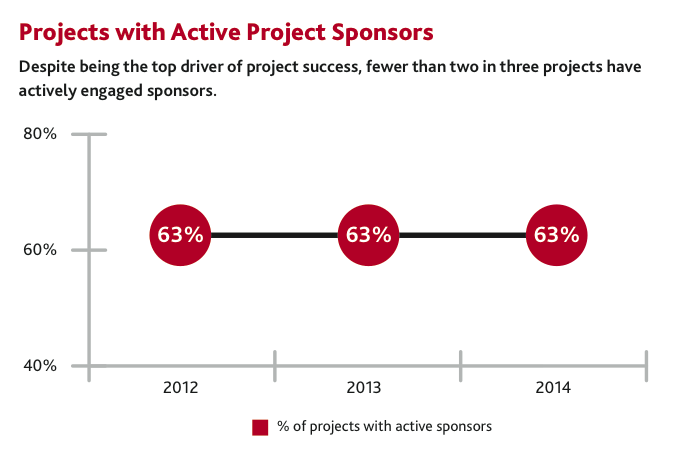Your concern about your sponsor’s lack of engagement is worth taking seriously. Several studies confirm that having an actively engaged sponsor is a top driver for project success. It’s the sponsor’s role to drive the project forward at a strategic level and to drum up organisational-wide support. No wonder the sponsor is imperative to project success. Unfortunately however, research also shows that less than 2 in 3 projects have sponsors who are actively engaged. That’s disconcerting and a situation that must be addressed.
You might think that there is little you can do to change the situation, but as the project manager you may be one of the best-placed people to influence the sponsor. And that’s exactly what I suggest you do. Sit down with her and talk through the situation, however unpleasant you think it might be. What other options do you have? Hope that she will enrol herself on a project sponsorship course and that she will miraculously start prioritising the project over her day job? A better strategy would be to actively do something to resolve the situation.
It’s human nature to shy away from that which we find unpleasant and to avoid a sensitive conversation, but only an honest discussion between the two of you can get the relationship back on track and give the project what it needs. Don't talk yourself out of it even if there is a little voice in your head saying that the sponsor is more senior than you and who are you to raise this with her? Stand firm on the project’s needs and find a way to articulate what good sponsorship looks like and why it’s required. But of course you also need to appreciate your sponsor’s situation and make it as easy as possible for her to contribute given her other commitments.
As you prepare to have the conversation, consider that your sponsor may not be aware of what her role actually is. As a project manager you are likely to be much more in tune with the kind of governance that the project needs. Your sponsor is primarily focused on her day-job and may never have been the ultimate decision-maker on a project before. She may be oblivious to the negative effect she is having.
In order to make your sponsor understand what it is that needs to change, be specific about the type of sponsor engagement that you feel the project needs more of. Is this about chairing the monthly steering committee meetings, attending project definition workshops and championing the business case, or is the important point that she needs to make herself more available as a sounding board for ad-hoc queries and issues that are beyond you to resolve? It would also be helpful if you talk about the benefits to the project if she were to be more engaged. She needs to realise that her role carries real significance. And don't forget to highlight times when you felt that she gave the team really good and clear direction. That will help her to understand what good sponsorship looks like in practice.
During your conversation, show empathy for your sponsor and ask questions that help you appreciate her situation. It’s easy to judge someone else and think that they are not doing a good job, but in reality your project sponsor may have a myriad of other things to attend to and may perceive the situation very differently. Her view may be that you escalate too much and that you need to be more self-directed.
It’s important that you respect your sponsor’s time and that you don’t escalate and lean on her more than necessary. Consider in which ways you can make it easier for her to provide input given her time constraints. Maybe you can do a better job at distilling information for her, or summarizing options, impacts and recommendations before you seek a decision. But the best approach would be to simply ask her how she would like you to escalate to her and to openly talk about where your lines of responsibility begin and end.
If your conversation is fruitful it will bring any underlying issues to the surface and result in your sponsor’s engagement and decision-making being more consistent. Go for it! You might not have any other options.
If you liked this post, you may also like:
How to deal with skeptical stakeholders
Become a better communicator with DISC profiling
Is Fear Of The Unknown Holding You Back?
Overcoming Resistance to Change
Are you bridging the gap between vision and delivery?









 RSS Feed
RSS Feed